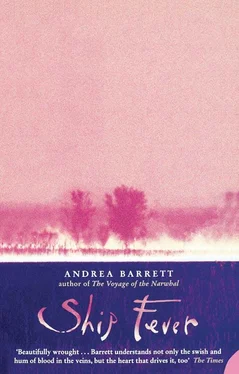Annie would be back any minute, he thought, as he closed his eyes. The breeze that blew through the windows was balmy and carried the scent of roses. A cardinal perched in a pyracantha whistled his four-note summons again and again.
When he woke, it was almost dark. The door to the library opened behind him, and he lifted his head with a start. “Annie? Could I have my clothes?”
The figure behind him caught her breath. “Lauchlin?” he heard Susannah say. At first he thought he’d dreamed her voice. “Lauchlin? Is that you? Whatever are you doing here?”
He rose without thinking, his blanket swirling about him like a cloak. There she was before him, a book in her hand, clad almost as lightly as him in a maroon dressing gown. In the instant before he blushed and turned, he registered how little she had on beneath the glossy silk.
“I’m so sorry,” he said to the fireplace. “Can you pardon me? When I got here you were out, and Annie took all my clothes and made me wait downstairs while she went to fetch others from my house, and I got so tired of waiting for her that I came up here. I must have fallen asleep…what happened to Annie? Why didn’t anyone tell you I was here?”
His voice stumbled, caught between his apologies and all he wanted to say and couldn’t. That she was beautiful in this dusky light, that he had not seen her hair loose in years and loved it; that he had dreamed of her, again and again, during his weeks at Grosse Isle. If only he hadn’t been wrapped in this wretched blanket, he might have allowed himself to turn and gain another glimpse of her. But that would be wrong; she was surely just as embarrassed by her own relative state of undress as by his.
He could hear her backing out of the room, but she was laughing and didn’t seem offended. “Poor Lauchlin! So you ran afoul of Annie’s obsession with dirt,” she said. “I just got in myself — Annie wasn’t in the kitchen when I got home, but I didn’t dare skip my ritual wash. I’m the one who should apologize: my servants mistreating you and then me showing up like this. Just give me a minute to get into some proper clothes. Then I’ll find Annie and see what’s happened to yours.”
He turned around again only when he heard the door close. His skin was burning beneath the blanket — never, not even as children, had they shared such an intimate moment. He tried not to imagine how it might be to have her appear like this before him willingly; he tried, and failed, and then sank down in the chair with a groan, more jealous of Arthur Adam than he could stand to admit. When the door opened behind him again, he didn’t dare rise or turn.
This time it was truly Annie, who was vexed. “Your clothes,” she said. She set the pile on the library table and stood with her hands on her hips. “This whole time I thought you’d disappeared — how was I to know you’d let yourself up here? And then Mrs. Rowley creeping in, without even a word to let me know she was back — an hour I’ve been back myself, after running all over town, and when I return there’s not a sign of you.”
Lauchlin sighed and rested his chin in his hands. “Annie,” he said. She had grown very forward these past months, but he did not feel it was up to him to correct her. Arthur Adam would straighten her out quickly enough, when he came home. “If you knew what I’d been doing these last weeks, or how tired I was — I just came in here to wait for a bit. Where did you think I’d gone, with only this bit of blanket to cover me?”
“I’m sure I don’t know,” Annie said. “I’m sure, after seeing the state of your household, that I wouldn’t have the least idea what a gentlemen like yourself would be up to. Your Mrs. Carlson sends her apologies about the darned shirt, and says to tell you she couldn’t find another clean, she’d packed everything away against your return. Mrs. Rowley will be down directly.” But then, as if she’d understood for the first time that he was naked beneath his blanket, she relaxed a bit. “You’re looking foolish in that get-up,” she said. “Go on — get dressed.”
Was that a smile? She shut the door behind her and Lauchlin dressed quickly. By the time Susannah returned, with her hair piled up and her frock demurely buttoned over her shoulders and neck, he was almost respectable himself. “Forgive me for barging in like this,” he said.
She swept across the room and seized his hands. “Don’t be ridiculous,” she said. “I’m so glad to see you — you’re well? No trouble, I hope.”
He squeezed her hands gently and then pulled away. “No more than what’s become a matter of everyday. Dr. Douglas sent me back on some business — I return to the island tomorrow. I was just hoping to see you and Arthur Adam briefly. I had no idea he was still away.”
For a minute Susannah occupied herself with the lamps. “Couldn’t Annie do that?” he said gently.
“I hate to trouble her.”
In the warm glow of the lamplight, she looked almost as lovely as she had in the dusk. Perhaps a little cooler, a little harder, as if her clothes had armored her. Just for a moment he found himself thinking of Nora, whose appearance and manner toward him were always the same. Whose eyes had that mysterious ring around their irises…
“I asked her to bring us some supper, and she’s annoyed enough over that. Arthur Adam will be so sorry to have missed you — you know he’s in London? Still?”
He didn’t want to talk about Arthur Adam. What he wanted was to build a fire and lie down on the rug before it, his head in her lap, and tell her all he’d seen and felt in her absence. He wanted to pull a strand of her hair over her shoulder, against his cheek, but as long as she bustled about like this, and chattered as if this were a social call, all he could do was respond in kind. “Annie said something about that.”
Susannah gestured toward one of the armchairs and then seized a folder of papers before settling in a matching chair across from him. “This is what he’s been doing,” she said, ruffling through the folder and pulling out newspaper clippings. “Quebec, Montreal, Boston, London — there’s hardly a first-rate paper he hasn’t written for, about the famine and the emigration problem. Now he’s calling for wholesale reform of the shipping laws. Look at this.”
She pulled out a long column from a London paper. “‘ The entire system of conveying these unfortunate Irish emigrants stands in need of revision. Who, if not the Government, will assist and protect these poor people banished by hunger from their native land? We are bound to regulate matters so as to see that too many are not crowded upon one ship, and that their accommodations are decent. We are bound to see that they have sufficient provisions to endure the voyage in good health, and that medical attendants be on board to see to their needs. We are bound’… well, you get the idea.”
“I do,” Lauchlin said. He grasped both Arthur Adam’s efforts and the way this evening was to go, at least until supper had arrived and been eaten and then cleared away. Annie or one of the other servants might pop in here at any moment, and it was surely their looming presence that made Susannah so circumspect. “I couldn’t agree with him more, after all I’ve seen this month. You have to admire him, for setting this all down on paper.” He could not help feeling a twinge, as he compared that thick file of articles with his own private scribbles.
“Well, of course,” Susannah said. “Now tell me about Grosse Isle. Your letters have been so brief.”
He was reluctant at first, but she pressed him and he found himself telling her some of the details he’d otherwise confided only to his diary. “The worst thing,” he added, “the worst is sending passengers upriver from the island, knowing— knowing —that they’ll be sick within a few days, that they’ll bring the sickness here.”
Читать дальше
Конец ознакомительного отрывка
Купить книгу












